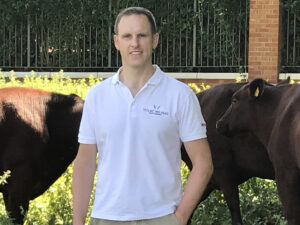
As grass quality and availability decline, appropriate supplementation for dairy herds will be required to safeguard against milk production decreases.
While the higher fibre content of late season grass can be beneficial to milk fat production, a decrease in dry matter and energy availability will reduce performance from grazing, with milk yield suffering as a consequence, says Dr Richard Kirkland, nutritionist for Volac Wilmar Feed Ingredients.
To help fill energy gaps in late season grazing additional supplementation will be needed and rumen-protected fat supplements should be a key component in buffer rations to maximise milk yield and quality. Delivering 2.5-times the energy of cereals and more megajoules per bite, fat supplements have a high energy density and support rumen function.

potential, rumen function must be made a priority. High-starch energy supplements like cereals will lead to the accumulation of acid in the rumen as a result of fermentation, compromising rumen pH and putting the animal at risk of acidosis, and low milk fat. While caustic or other alkali treatments will help, large quantities of cereals can be expected to have a negative impact on butterfats. Digestible fibre sources like citrus pulp and soya hulls will give support to milk fat,” says Dr Kirkland
Performance benefits from choosing the right fatty acids
When it comes to selecting a fat supplement for buffer feeding, rumen protection and fatty acid profile need to be made a priority.
Unprotected fats cause an ‘oil slick’ effect in the rumen, physically coating fibre and reducing digestibility. However, rumen-protected fats provide a dense energy source without these risks to rumen function.
It is also important to consider which type of fat supplement is most appropriate for an individual farm as the different fatty acid components will have a major bearing on the expected response.
Products with high levels of palmitic acid (C16:0) will improve milk fat production, but care should be taken if offered to cows in earlier stages of lactation as additional output can be at the expense of loss of body condition. The calcium salt products are a blend of palmitic and oleic (C18:1) fatty acids which will be less stimulatory to milk fat, but the C18:1 component aids fat digestibility (increased energy supply), fertility and promotes improved body condition.
“Cow condition, stage of lactation and requirements from the milk contract are key factors to consider when investing in a fat supplement to provide maximum benefit for each farm,” says Dr Kirkland.
When feeding a rumen-protected fat supplement like Megalac which has a balanced ratio of C16:0 and C18:1 fatty acids, producers can support milk yield throughout lactation while protecting fertility.
In research findings from the Tasmanian Institute of Agriculture’s Dairy Research Centre, cows on a low-input grazing system produced 2.1kg additional milk at peak lactation, and continued to respond with 1.5kg milk at 200-days in milk following supplementation with 250g/day of Megalac rumen-protected fat, while maintaining high levels of fertility.
“Throughout the end of the grazing season, buffer feeding with rumen-protected fat supplements will help support energy demands without compromising rumen function. When selected based on fatty acid profile, producers also have the opportunity to benefit desired milk production targets based on their individual contracts and business objectives,” concludes Dr Kirkland.
Help keep news FREE for our readers
Supporting your local community newspaper/online news outlet is crucial now more than ever. If you believe in independent journalism, then consider making a valuable contribution by making a one-time or monthly donation. We operate in rural areas where providing unbiased news can be challenging. Read More About Supporting The West Wales Chronicle

























